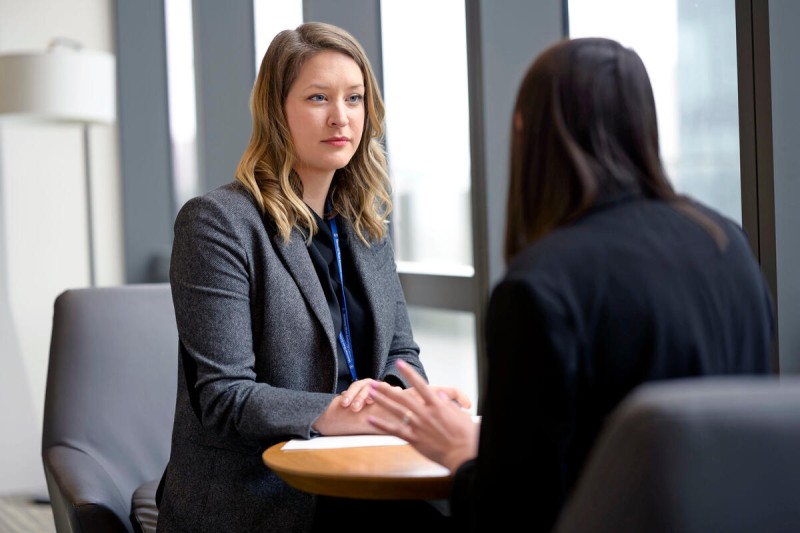
If you’re diagnosed with cancer, your first instinct may be to get it treated right away because there’s not a moment to waste.
But what if your doctor says you don’t need treatment? For some types of cancer, especially those that are early-stage and are unlikely to spread and cause harm, doctors may instead recommend active surveillance — sometimes called watchful waiting.
At Memorial Sloan Kettering Cancer Center (MSK), active surveillance is most often recommended for some types of:
Active surveillance has become an important part of cancer care, as doctors strive to help patients avoid the side effects of treatments that are not likely to offer any benefit.
Some people find the active surveillance approach unsettling. MSK clinical social worker Angela Katrichis, MSW, LCSW, offers tips for managing any fear and uncertainty around the decision not to treat a cancer right away.
Active surveillance doesn’t mean doing nothing.
It’s called active surveillance because it is active: Patients undergo regular scans, bloodwork, and/or other tests. The schedules for these tests are based on scientific studies of how these low-risk cancers are most likely to behave.
If test results ever suggest that the cancer has progressed, the doctor may recommend moving to a more dynamic treatment.
Being in active surveillance can cause a lot of stress and anxiety.
For many people, it’s difficult to accept that there is cancer in their body that is not being treated.
The stress may be especially intense around the appointments for tests to monitor the cancer — a situation commonly called “scanxiety.”
“One of the most important things to do when you’re facing a test is to just remember to breathe,” Katrichis says. “It sounds simple, but it can be an effective tool to feel grounded in your own body amidst the swirling of nerves.”
Putting trust in your care team can also help relieve the stress of active surveillance. Feel free to ask them to explain again why aggressive treatment is not needed at this time and why they believe watchful waiting is the best option for you.
MSK offers tools to help people face anxiety and uncertainty related to active surveillance.
“I like to use the analogy of surfing,” Katrichis says. “We want to ensure that folks have access to the supports that allow them to be able to stay afloat and ride the emotional waves of this journey.”
Mindfulness and meditation can help people cope with the anxiety. MSK’s Integrative Medicine Service has put together a meditation and mindfulness library with recordings that help people in every stage of the cancer journey. MSK’s website also hosts a video series for practicing tai chi, a traditional Chinese martial art that has been shown to help reduce stress.
The Integrative Medicine Service also offers a variety of therapies, classes, and workshops for patients and their caregivers. Those unable to travel to one of MSK’s locations can make use of the Integrative Medicine at Home Membership Program.
MSK offers therapy and support groups specifically for people in active surveillance.
Individual counseling and supportive programming are available for patients in active surveillance. MSK’s Counseling Center offers individual and group counseling overseen by a team of psychiatrists, psychologists, and social workers.
For people who may be interested in exploring resources closer to home, MSK’s social workers can help them connect to additional supportive resources.
“Connection can be a powerful antidote to the isolation one can feel navigating the uncertainties of active surveillance,” Katrichis says. “Through connection with a support person or community of peers, it allows patients and their loved ones the opportunity to begin trying to make sense of this experience.”
Survivor’s guilt is common among people in active surveillance.
“When those under active surveillance walk into their treatment center for an appointment, it may be hard for them to witness the impact of cancer on others around them, especially when they perceive that experience as being different from their own,” Katrichis says. “It can bring up feelings of gratitude while at the same time raising fears about what could be. It can be a heavy burden to hold those two different sentiments at the same time.”
She recommends accepting that these feelings are normal, which can go a long way toward relieving survivor’s guilt.
It can be helpful to embrace your identity as a cancer survivor.
“At MSK, we use the term ‘cancer survivor’ to describe anyone who has faced a cancer diagnosis,” Katrichis says. “For someone who’s been told they have cancer, they are forever changed by that experience. They now face the task of having to learn what this means for them and how to find their new sense of ‘normal’ — regardless of whether they are in active treatment or active surveillance. But they do not have to face this on their own. We are here to help.”

